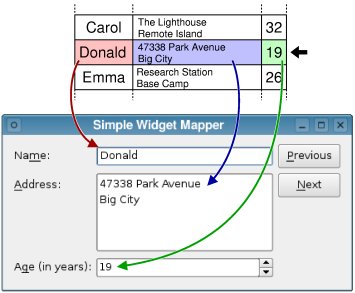
[Previous: Presenting Data in a Table View]
Using the SQL models described above, the contents of a database can be presented to other model/view components. For some applications, it is sufficient to present this data using a standard item view, such as QTableView. However, users of record-based applications often require a form-based user interface in which data from a specific row or column in a database table is used to populate editor widgets on a form.
Such data-aware forms can be created with the QDataWidgetMapper class, a generic model/view component that is used to map data from a model to specific widgets in a user interface.
QDataWidgetMapper operates on a specific database table, mapping items in the table on a row-by-row or column-by-column basis. As a result, using QDataWidgetMapper with a SQL model is as simple as using it with any other table model.

The Books demonstration shows how information can be presented for easy access by using QDataWidgetMapper and a set of simple input widgets.
[Previous: Presenting Data in a Table View]
© 2008-2011 Nokia Corporation and/or its subsidiaries. Nokia, Qt and their respective logos are trademarks of Nokia Corporation in Finland and/or other countries worldwide.
All other trademarks are property of their respective owners. Privacy Policy
Licensees holding valid Qt Commercial licenses may use this document in accordance with the Qt Commercial License Agreement provided with the Software or, alternatively, in accordance with the terms contained in a written agreement between you and Nokia.
Alternatively, this document may be used under the terms of the GNU Free Documentation License version 1.3 as published by the Free Software Foundation.




